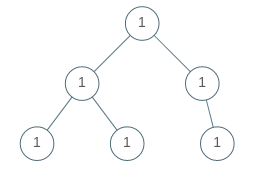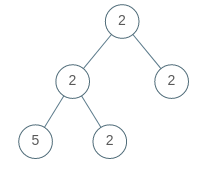LeetCode-in-Java
965. Univalued Binary Tree
Easy
A binary tree is uni-valued if every node in the tree has the same value.
Given the root of a binary tree, return true if the given tree is uni-valued, or false otherwise.
Example 1:

Input: root = [1,1,1,1,1,null,1]
Output: true
Example 2:

Input: root = [2,2,2,5,2]
Output: false
Constraints:
- The number of nodes in the tree is in the range
[1, 100]. 0 <= Node.val < 100
Solution
import com_github_leetcode.TreeNode;
import java.util.LinkedList;
/*
* Definition for a binary tree node.
* public class TreeNode {
* int val;
* TreeNode left;
* TreeNode right;
* TreeNode() {}
* TreeNode(int val) { this.val = val; }
* TreeNode(int val, TreeNode left, TreeNode right) {
* this.val = val;
* this.left = left;
* this.right = right;
* }
* }
*/
public class Solution {
public boolean isUnivalTree(TreeNode root) {
int val = root.val;
LinkedList<TreeNode> queue = new LinkedList<>();
queue.add(root);
while (!queue.isEmpty()) {
TreeNode node = queue.poll();
if (node.val != val) {
return false;
}
if (node.left != null) {
queue.add(node.left);
}
if (node.right != null) {
queue.add(node.right);
}
}
return true;
}
}

